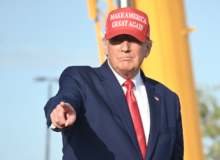By Gary S. Goldman,
Remember when gasoline topped $3 a gallon and you thought, “I’ll never get used to this.” That was a few months ago. Today, you are probably happy it is less than $4 a gallon. That is how things work: we accept the things we can’t change, we adjust to them, and they lose their power to shock us.
The same thing happens with international sanctions. When they are first imposed against a country, they may seem overwhelming. But the longer they last, the more that people get used to them and the less influence they have.
So, when a government decides to impose sanctions on a potential foe, it is important to go big quickly: get the maximum impact right up front, and make the country change its behavior before it has a chance to get used to living with the sanctions. It is also important to not permit exemptions from sanctions that end up destroying the goal of imposing economic pain on an offending regime.
This all brings us to the situation in Ukraine.
When Russia launched an unprovoked invasion in February, the United States, NATO, and our allies all agreed that it couldn’t be allowed to stand. In response, the West imposed sanctions against Russia.
“The United States and more than 30 allies and partners across the world have levied the most impactful, coordinated, and wide-ranging economic restrictions in history,” the White House announced. “Experts predict Russia’s GDP will contract up to 15 percent this year, wiping out the last fifteen years of economic gains.”
But we didn’t do enough. That was because a major European company didn’t want us to.
“Sanctions on Russian titanium would hardly harm Russia, because they only account for a small part of export revenues there. But they would massively damage the entire aerospace industry across Europe,” a spokesman for aerospace giant Airbus said back in April.
As the Russian war machine rolled across Ukraine, Airbus held to its position. “We think sanctioning titanium from Russia would be sanctioning ourselves,” Airbus CEO Guillaume Faury said in June. He calls titanium sales “one of the few areas of business where it is in the interest of no party to disrupt the current situation.”
Okay, so Airbus needs titanium. That makes sense. It’s a rare metal, very light, very strong, very flexible. It combines well with carbon, so it is used in making aircraft bodies. Airbus gets about half the titanium it uses from Russia. That, in a nutshell, explains why it doesn’t want to see sanctions imposed against the Russian metal.
But the point is that sanctions need to be as punishing as possible, as quickly as possible. Weak sanctions often fail. As long ago as 1998, the Brookings Institution was warning that: “In a global economy, unilateral sanctions tend to impose greater costs on American firms than on the target, which can usually find substitute sources of supply and financing.” The U.S. can’t afford to be alone in sanctioning Russia. We need the entire world on board. Instead, we have a key European company working at cross-purposes.
This isn’t the first time Airbus took the Russian side. The company has been stockpiling Russian titanium since Moscow’s 2014 annexation of Crimea, the company’s Chief Financial Officer Dominik Asam told Bloomberg. It is worth asking which side Airbus is on: the side of NATO and the U.S., which it makes weapons for, or the side of the Russians, who those weapons may need to be used against.
Russians have often shown an ability to survive harsh economic conditions. But the goal of sanctions isn’t to punish Russian people. It is to change the behavior of the Russian government, so it will pull out of Ukraine and stop killing civilians. Airbus claims to be on the side of the West. But its actions make it seem like a Russian stooge.
Airbus needs to make clear whose side it is on. Let’s sanction Russian titanium, or else sanction companies that depend on that metal. If Airbus is allowed to blow up sanctions, the sanctions may fail.





















Join the conversation!
We have no tolerance for comments containing violence, racism, vulgarity, profanity, all caps, or discourteous behavior. Thank you for partnering with us to maintain a courteous and useful public environment where we can engage in reasonable discourse.